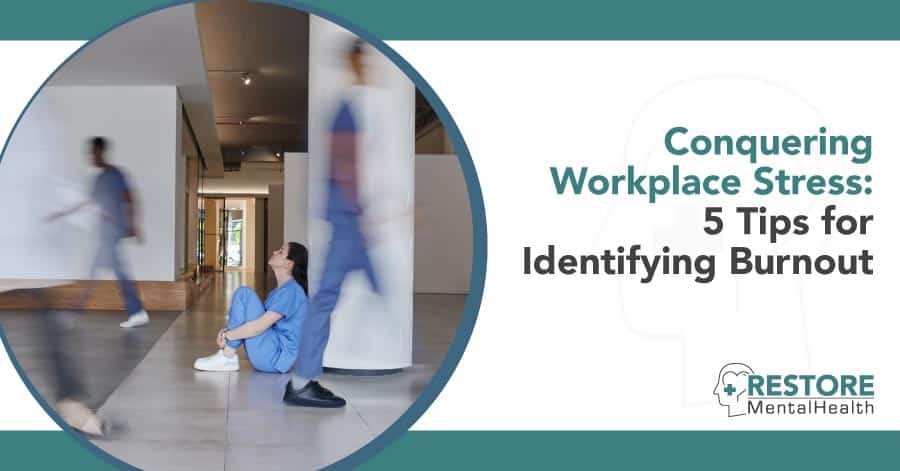Feeling stressed from work? You’re not alone. A recent study shows that nearly three of five employees were dealing with negative impacts from workplace stress, such as lack of motivation, emotional exhaustion and physical fatigue.
More serious problems begin when stress snowballs into burnout. Read on to learn more about the difference between the two, burnout symptoms to look out for and what you can do to reverse the damage.
What Exactly Is Burnout?
While it’s normal to feel stressed out at work now and then, if you aren’t able to properly manage that stress, it can lead to burnout — a chronic syndrome that has the potential to seriously impact your job performance, as well as your mental and physical health. Burnout differs from stress in that it’s ongoing and in many cases, debilitating. Those who are stressed still see a light at the end of the tunnel, that it won’t always feel this way. People experiencing burnout are in a state of hopelessness and helplessness, where the future seems much more bleak.
Why Is It Important to Identify Burnout?
Leaving burnout unchecked can take a major toll on your day-to-day life. Those who are experiencing burnout may find it difficult to complete tasks at work the way they once did, which could put their careers in jeopardy. Aside from professional ramifications, burnout could potentially develop into depression, increase your chances of becoming physically sick and isolate you from your peers.
What Are Some Common Burnout Symptoms?
If you’re concerned that your workplace stress may be teetering into burnout territory, keep an eye out for these common signs and don’t leave them untreated.
- Decreased productivity: Finding it hard to check off tasks on your to-do list? This is a common symptom of burnout. If your concentration levels are at an all-time low, you can’t complete your assignments, you turn in work late and check out during team meetings, you could be at risk.
- Increased irritability: Does the chime of an incoming email make you irrationally annoyed? Are you being short with colleagues you used to get along with? When approaching projects at work, do you ask yourself, “What’s the point?” Feelings of irritability, cynicism and numbness are typical for people who are burned out. Not only are the negative and distant feelings unpleasant, but they can isolate you from your teammates who might otherwise be able to offer support.
- Insomnia: If you find yourself struggling to drift off at night, sleeping fitfully or ruminating on work-related problems into the early hours of the morning, this could be the result of job burnout. Difficulty sleeping is a common physical symptom of the condition, and the lack of rest can further negatively impact your mood and productivity. If these sleep disturbances are happening more and more often and in conjunction with other symptoms, they’re likely due to burnout.
- Frequent illness: If you’re falling ill more often, including dealing with increased headaches, back pain and muscle aches, it could be a result of burnout. The chronic stress causes tension throughout your body and takes a toll on your immune system, leading to all kinds of physical discomfort.
- Complete exhaustion: This means you’re more than just fatigued, you’re totally drained — physically and mentally. If you find it difficult to get out of bed, dread going to work and feel like it’s a struggle to simply make it through the day, it’s likely you have crossed the stress threshold and are fully burned out.
How to Deal With Burnout
You don’t need to suffer from burnout in silence. If you recognize that your stress has reached an unhealthy level and your health is at risk, reach out for help. Remember, this is a common problem, nothing to be ashamed of, and a better, more balanced work/life relationship is possible.
Talk to Someone You Trust
A good first step is to speak with your manager or a trusted colleague. If you’re able to delegate tasks and lighten your load, even temporarily, don’t be ashamed to ask for that support. If you have vacation time available, take it. Allow yourself to fully unplug from work for as long as you’re able and catch up on rest. Nothing is more important than your health — calls and emails can wait.
If you don’t feel comfortable discussing your burnout symptoms at work or are unable to take immediate time off, call a friend or loved one in the interim. Expressing yourself and feeling heard can make a real difference in your mood.
Increase Self-Care
It’s also helpful to try to build self-care time into your regular routines. Even if it’s just blocking out 15 minutes on your calendar for a quick yoga session or a walk in the fresh air, little changes can add up to less stress. Staying active can help calm your nervous system and may also help you get better sleep if burnout has been keeping you up at night. You might also consider starting the day with a quick journaling session. Release any pent-up emotions onto the page before you set out on another workday.
Get Help From a Professional
Finally, seeking professional help is an excellent option for mitigating long-term job burnout. Working with an experienced, caring counselor can give you the tools you need to manage stress and build resilience. It’s possible to undo the damage from burnout and prevent it from creeping back into your life if you’re willing to accept help. Know that you never need to face these kinds of issues on your own.
Learn More at Restore
If you feel you’re in the throes of burnout, all is not lost. You can contact us at Restore to learn more about how our team can help you cope with and recover from chronic stress. Call (877) 594-3566 to speak to a mental health practitioner — we’re here for you.



